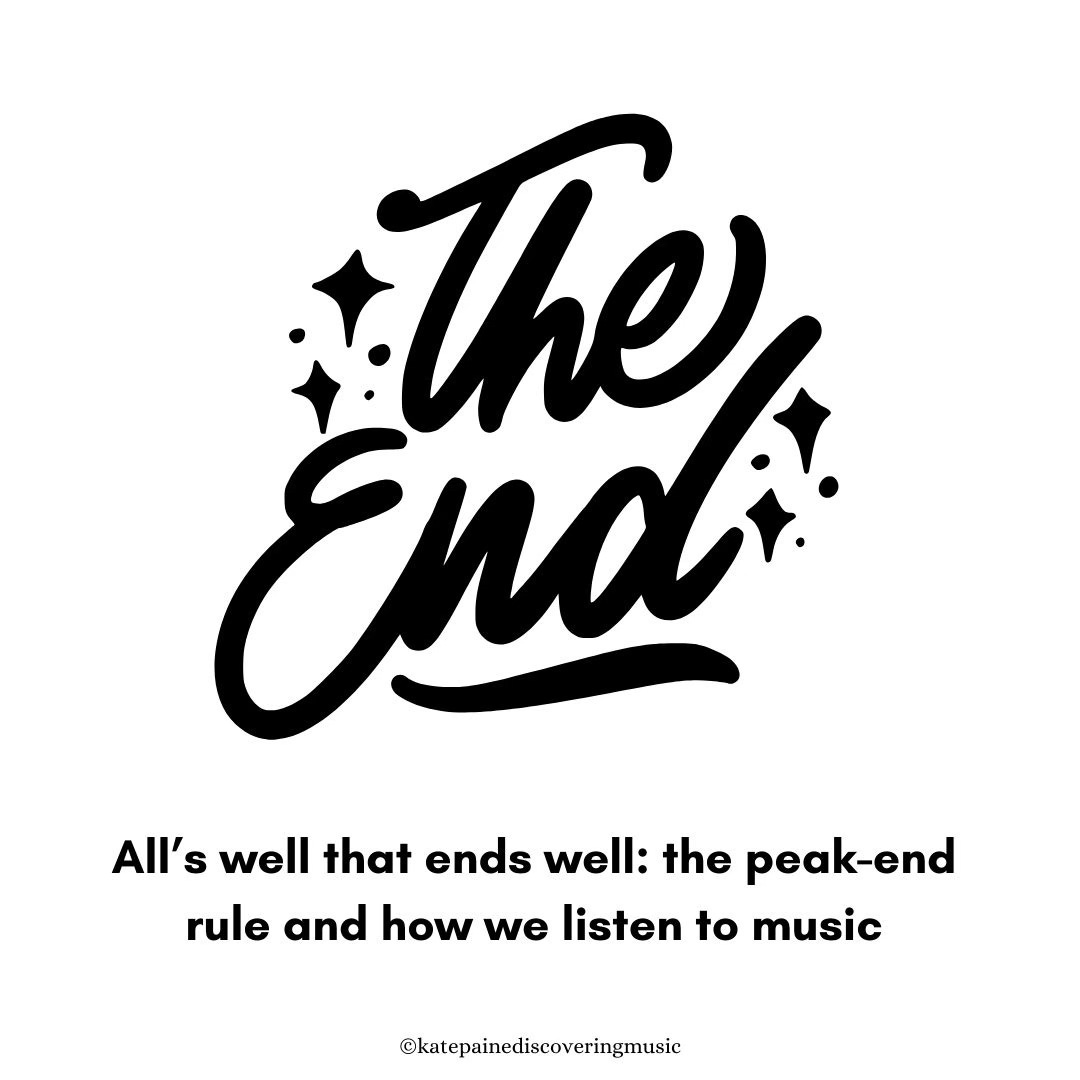All's well that ends well
The peak-end rule and how we listen to music
Hello music-loving friend,
If there’s one thing we’re all good at it’s selective recall.
Start reminiscing about your last holiday and it’s very likely you won’t think of the delayed flights, long queues, or the days of terrible weather. Instead, your memories are going to be dominated by two key moments. One will be the most intense moment in your holiday, such as your first time actually standing on a surfboard, seeing that stingray while snorkelling amongst the coral, or maybe something unpleasant, such as that night of food poisoning. The other will be whatever you did at the very end of the trip, like a walk along the beach on the evening of your last day.
Your memories of these moments are likely to be pretty vivid. You’ll recall that feeling of riding the wave, for example, and remember that beautiful bittersweet feeling of tranquility mixed in with a dose of sadness as you walked along the beach knowing this was the end to your holiday.
If you think back on the last concert or gig you went to, chances are you won’t dwell on the awful people sitting behind you, the uncomfortable seat, and the queue to get in. Instead, you’ll probably remember a particularly climactic chorus from in the middle of the concert and the last song. And it’s these two moments that will influence your perception of the entire experience.
It’s not that the rest of your holiday wasn’t worth remembering or that the concert was boring apart from these two moments. It’s just that your brain simply doesn’t have the capacity to remember every minute of every day, so we selectively remember instead.
Your brain, in other words, is curating your experience, turning it into a ‘best-of’ situation, focusing on one significant moment (the stingray!) and the ending, a bit like a highlights reel or a series of snapshots for you to peruse later on.
This phenomenon is called the peak-end rule, a cognitive bias first proposed by the psychologists Kahneman and Fredrickson in 1993 (you can read more about the peak-end bias in The Power of Moments by Chip and Dan Heath).
How music works: how we remember (or not) the music we hear
You might be wondering what the point of going to hear live music is if you’re not going to remember everything. But it’s important to remember (ha ha) that what you do recall afterwards is only ever a tiny part of what is very much an in-the-moment experience.
The act of listening to music is transitory. It’s an immediate and profound in-the-moment sensory and emotional experience. And this ephemeral aspect of music is a huge part of its beauty.
But while we might not recall everything we’ve heard afterwards, snatches of song and melody and rhythm do live on in our heads. Sometimes a song will haunt you for an entire day, you’ll find yourself tapping out a rhythm without even thinking about it, or a chorus or part of something you heard at a concert will emerge at odd times from the depths of your brains (like deep-sea creatures emerging from the gloom).
And the more familiar you are with a song or piece of music the easier it will be to recall in-between listens. Familiarity will unlock deeper layers, enhancing both your anticipation of what you’re about to hear and your understanding, making it a richer experience.
It’s also important to note that even when you are fully in the moment and listening to a piece of music you’ve heard before, your experience of it will likely not be the same as it was last time. In Tell me a story I talked about how every time you listen to music both the music and you undergo a transformation, different at the end to how you were at the beginning.
And this transformation will be different every time you hear the same song, because our listening experience depends on the context in which we listen to something. How we’re feeling, how the musicians are feeling, the speed at which they play or sing, the dynamics (loud and soft) they use (for more on dynamics go to Dynamics in Music) and so on, will all be subtly different each time a song or piece is performed.
So next time you’re at a gig or a concert don’t worry about what you might or might not remember. You probably will only recall a peak and the ending, but you can remind yourself that while you were actually listening you enjoyed every note, and that next time you hear those notes played or sung live you’ll enjoy them again, even if it’s in a different way.
Thank you for taking the time to read this post. If there's anything else you're curious about or would like me to explore further, let me know! You can comment on this post or send me a message at katepainediscoveringmusic@substack.com
Thanks, Kate ❤️



